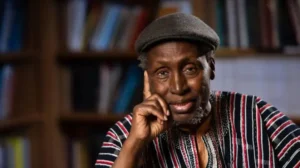NGŨGĨ WA THIONG’O (1938–2025) – A LION OF AFRICAN LITERATURE FALLS SILENT

Buford, Georgia, United States | May 29, 2025 — The world has lost one of its most fearless literary giants, Ngũgĩ wa Thiong’o, who passed away on May 28, 2025, in Buford, Georgia, at the age of 87. A revolutionary novelist, playwright, essayist, and unrelenting advocate for African languages and decolonization, Ngũgĩ’s death marks the end of an era for global literature. His life was a testament to the power of words as weapons of resistance, and his legacy will forever echo in the halls of academia, activism, and art.
A Life Forged in the Fires of Colonialism
Born James Ngũgĩ on January 5, 1938, in Kamiriithu, Kenya, Ngũgĩ came of age during the brutal suppression of the Mau Mau uprising, an experience that deeply shaped his political consciousness. Educated at Makerere University in Uganda and later at the University of Leeds, he burst onto the literary scene with his debut novel, Weep Not, Child (1964), the first English-language novel published by an East African writer. The book, a poignant tale of a family torn apart by Kenya’s struggle for independence, announced the arrival of a bold new voice in African literature.
His early works, including The River Between (1965) and A Grain of Wheat (1967), masterfully wove together personal and national histories, capturing the pain and promise of a continent breaking free from colonial rule. Yet, as Kenya transitioned from British rule to self-governance, Ngũgĩ grew disillusioned with the corruption and inequality perpetuated by the new elite—a theme that would dominate his later writings.
The Radical Turn: Rejecting English, Embracing Gĩkũyũ
In 1977, Ngũgĩ made a seismic shift that would define his career: he abandoned writing in English, the language of the colonizer, and began composing his works in Gĩkũyũ, his mother tongue. This decision was both artistic and political, a direct challenge to the cultural imperialism that had long dictated African literary expression. His first Gĩkũyũ novel, Caitaani Mũtharaba-Ini (Devil on the Cross, 1980), written on toilet paper while imprisoned without trial by the Kenyan government, became a landmark text in African literature.
His imprisonment (1977–1978) under President Daniel arap Moi’s regime only sharpened his resolve. Upon release, he went into 22 years of exile, teaching at universities in the U.S. and the U.K., yet never ceasing to write, speak, and agitate for justice. His seminal collection of essays, Decolonising the Mind (1986), remains a cornerstone of postcolonial theory, arguing that true liberation for Africa must begin with reclaiming its languages and narratives.
A Literary Titan and Global Voice
Despite his exile, Ngũgĩ’s influence only grew. His epic novel Wizard of the Crow (2006), a sprawling satire of dictatorship and greed, was hailed as a masterpiece, blending folklore, political allegory, and razor-sharp wit. He was perennially mentioned as a contender for the Nobel Prize in Literature, a recognition many believed he richly deserved.
In his later years, he continued to write prolifically, publishing memoirs like Dreams in a Time of War (2010) and Birth of a Dream Weaver (2016), which chronicled his journey from a colonial subject to a global intellectual. Even in his 80s, he remained a vocal critic of oppression, whether in Africa or abroad, and a passionate advocate for linguistic diversity.
A Man of Principle to the End
Ngũgĩ’s final years were spent in the U.S., where he was a Distinguished Professor of English and Comparative Literature at the University of California, Irvine. Yet, his heart never left Kenya. In 2004, he and his wife, Njeeri, survived a violent armed robbery and assault in Nairobi—an attack many suspected was politically motivated. Still, he returned to Kenya multiple times, always speaking truth to power.
He is survived by his wife, Njeeri, and his children—including the acclaimed author Mũkoma wa Ngũgĩ—along with countless writers, activists, and readers who found courage in his words.
A Legacy That Will Never Fade
Ngũgĩ wa Thiong’o was more than a writer; he was a freedom fighter whose battlefield was the page. He taught us that language is not just a tool for communication but a vessel of memory, identity, and resistance. His life reminds us that literature is not a luxury but a necessity—a means of imagining and fighting for a better world.
As tributes pour in from Nairobi to New York, one truth is undeniable: Ngũgĩ’s voice will never be silenced. His books will continue to inspire new generations, his ideas will keep challenging oppressive systems, and his name will forever be etched among the greatest thinkers of the 20th and 21st centuries.
Rest in power, Ngũgĩ. The struggle continues.
Funeral arrangements will be announced by the family. In lieu of flowers, donations may be made to [relevant organization promoting African literature or social justice].
(Word count: ~700)
